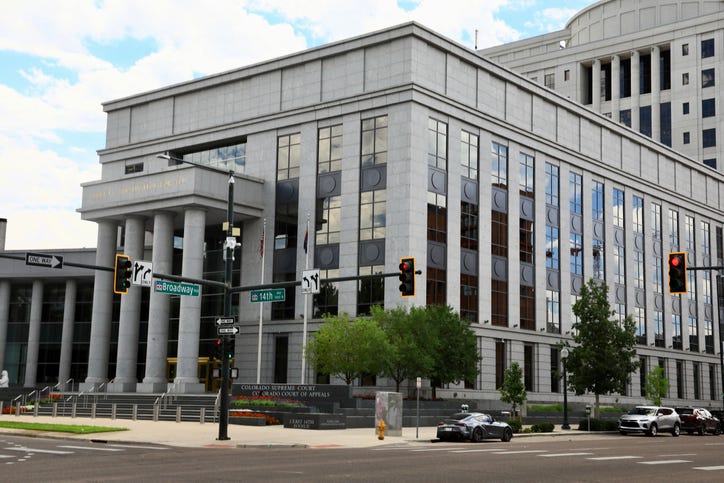Notice And Comment: The Colorado Supreme Court's Disqualification Of Donald Trump
Is the ruling legally sound? And what will SCOTUS do?

Welcome to Original Jurisdiction, the latest legal publication by me, David Lat. You can learn more about Original Jurisdiction by reading its About page, and you can email me at davidlat@substack.com. This is a reader-supported publication; you can subscribe by clicking here. Thanks!
Back in August, I published a Notice and Comment post asking you to debate whether Section Three of the Fourteenth Amendment disqualifies Donald Trump from holding the office of president again. Now the question has become more concrete: today the Colorado Supreme Court ruled “that President Trump is disqualified from holding the office of President under Section Three of the Fourteenth Amendment to the United States Constitution.” As a result, according to the per curiam opinion, “it would be a wrongful act under the Election Code for the Colorado Secretary of State to list him as a candidate on the presidential primary ballot.”
The court acknowledged the seriousness of the issues it confronted:
We do not reach these conclusions lightly. We are mindful of the magnitude and weight of the questions now before us. We are likewise mindful of our solemn duty to apply the law, without fear or favor, and without being swayed by public reaction to the decisions that the law mandates we reach
The Colorado Supreme Court’s ruling in Anderson v. Griswold is the first time a Section Three challenge has succeeded. Several lower courts across the country have ruled on Section Three challenges, rejecting them for various reasons—e.g., lack of standing, the political-question doctrine, or the inapplicability of Section Three to the presidency (which is how the Anderson trial judge, Denver District Judge Sarah B. Wallace, resolved the case).
Trump will appeal to the U.S. Supreme Court, according to a statement from his campaign. In the meantime, nothing will change, since the Colorado Supreme Court stayed its ruling:
[T]o maintain the status quo pending any review by the U.S. Supreme Court, we stay our ruling until January 4, 2024 (the day before the Secretary’s deadline to certify the content of the presidential primary ballot). If review is sought in the Supreme Court before the stay expires on January 4, 2024, then the stay shall remain in place, and the Secretary will continue to be required to include President Trump’s name on the 2024 presidential primary ballot, until the receipt of any order or mandate from the Supreme Court.
As a practical matter, booting Trump from the ballot is unlikely to affect the 2024 election outcome, since Colorado hasn’t gone Republican in a presidential election since 2004 (when President George W. Bush defeated Senator John Kerry). But the Colorado Supreme Court’s ruling matters because it sets the stage for the inevitable U.S. Supreme Court ruling on Section Three.
I haven’t had the chance yet to fully digest the 213 pages of opinions from the Colorado Supreme Court, which divided 4-3 (even though, interestingly enough, all seven justices are Democratic appointees). But as a predictive matter, I’m guessing that SCOTUS stays the Colorado Supreme Court’s ruling, sets the case for argument in February or March, and reverses, with at least one of the liberal justices joining the conservatives in ordering Trump back on the ballot.
I look forward to your thoughts—and as usual for Notice and Comment posts, comments are open to all readers, not just paid subscribers. Thanks!
[UPDATE (12/20/2023, 12:37 p.m.: If you’re looking for a helpful guide to the different issues and how they were addressed by the majority and dissenting opinions, check out this great breakdown by BriefCatch.]
Thanks for reading Original Jurisdiction, and thanks to my paid subscribers for making this publication possible. Subscribers get (1) access to Judicial Notice, my time-saving weekly roundup of the most notable news in the legal world; (2) additional stories reserved for paid subscribers; and (3) the ability to comment on posts. You can email me at davidlat@substack.com with questions or comments, and you can share this post or subscribe using the buttons below.




There are cases where the Supreme Court needs to rule unanimously for the interest of the judiciary's role in America to override any individual qualms about a particular case. For a generation, the Court unanimously upheld every desegregation case because it was important for the nation. If any of the three liberal jurists decide that this is the case they want to show off to their fans (hint, it certainly won't be Kagan), the cost will be immeasurable. A dissent from Jackson and/or Sotomayor on the question of judges deciding who can or can't be put on the ballot will poison future Supreme Court nominations far more than abortion ever did.
This us the same court that views free exercise of religion as a meaningless clause when LGBT rights are in conflict - I think that SCOTUS will grant cert and reverse